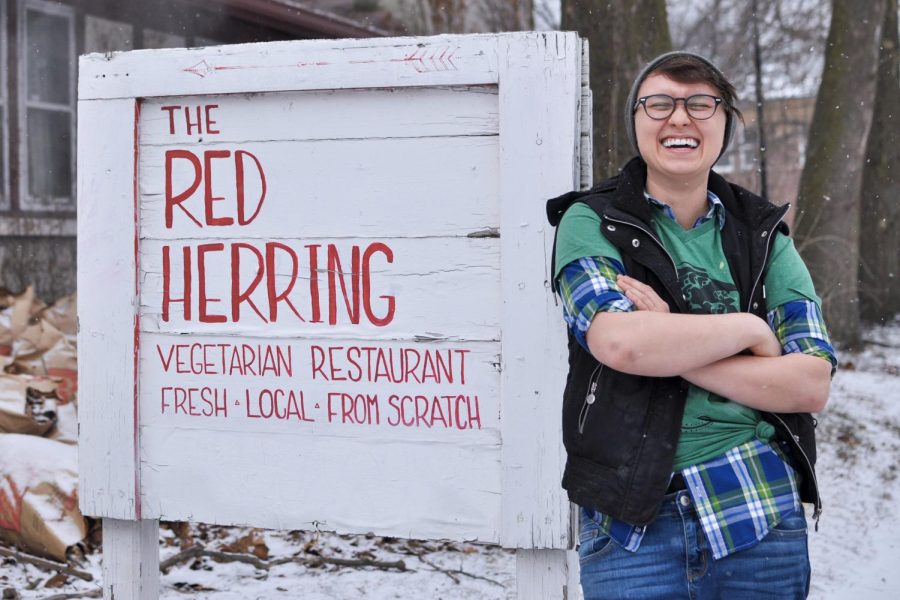The Red Herring owner reflects on life, implications of pandemic
Red Herring owner, Lo Kolb, poses in front of the sign outside the restaurant. Kolb talks about their journey to owning the business and future plans.
Feb 3, 2022
Inside The Red Herring on the corner of Oregon Street in Urbana, murals, handmade art and colorful drawings sprawl across the walls. In the basement, vacant tables are surrounded by piled-up boxes, while a soft glow emanates from the kitchen in the very back of the space. Inside, surrounded by pots and pans, Lo Kolb, the restaurant’s manager and sole employee, works.
Pre-pandemic, The Red Herring functioned as a restaurant, but the establishment has worn many other hats over the years. From being a coffeehouse to a meeting place for activism movements to a safe haven where people could listen to local artists and eat vegan food, The Red Herring has been shaped by the different groups of students who have visited since its opening in 1967.
“(The founders) wanted to create a radically accepting, politically open, full of artists and musicians type of space,” Kolb said. “Throughout the decades, it’s been constantly evolving and changing depending on what group of young people was here running it.”
After earning their undergraduate degree in Pennsylvania, Kolb moved to the Champaign-Urbana area to study at the University’s College of Law. While getting their degree, they became interested in veganism and began visiting The Red Herring every Wednesday night with their friends.
“I just loved it here,” they said. “This place was such an oasis for me. I was just experimenting with veganism at the time, so it was really kind of everything I needed. Both a very relaxing, comfortable, accepting space and the most nourishing food.”
Get The Daily Illini in your inbox!
In their second year of grad school, Kolb began working at The Red Herring, eventually becoming co-manager. After graduating, Kolb realized they weren’t interested in a legal profession. So instead, they decided to work at the restaurant full time.
“I’d never worked in an environment that was so loving and compassionate and value-centered,” Kolb said. “That was really beautiful and kind of exactly what I needed at the time.”
They said the decision was fueled by The Red Herring’s emphasis on community service and acceptance.
“At the time, I just really felt like I wanted to do something good and contribute something uncompromisingly good to society,” Kolb said.
Up until November, the restaurant had employed 8 to 10 staff members; but with the pandemic, Kolb was forced to lay off their team due to a shortage of funds.
“We encountered some really hard times, like all the restaurants,” they said. “Our supplies are both increasing in price and harder to find. Of course, we tried to do what we could pay our staff well as we could, but it was just was too much.”
Kolb appreciates the staff they had to let go.
Since then, Kolb has become the restaurant’s singular employee. Working with the Channing Murray Foundation, The Red Herring became a not-for-profit with the Bucket Brigade program to provide healthy meals and produce to the local needy. The restaurant also delivers pre-made meals as a way of sustaining its income and community service initiatives.
Kolb said the pandemic has also allowed reflection on what the next steps for The Red Herring will be. After a period of hardship, they say the opportunity to choose what’s next has emerged.
“I am finally at this place where I’m excited about the opportunity of us closing to have the time to think about what we actually want to be,” they said.
In the future, Kolb hopes to turn the space into a coffeehouse that will serve as a space for the queer community. They say that creating queer spaces within Champaign-Urbana is one of their passions.
“Our first next step is going to be a queer coffeehouse and open mic night,” Kolb said. “Being a coffeehouse used to be a big part of The Red Herring’s identity. I’m excited to explore that again, and making queer space in the city is one of my passions.”
Ultimately, Kolb sees The Red Herring as a place that has played a large role in shaping them. They credit the space for bringing them back to their values.
“I think I’ve been shaped more by this place than I’ve shaped this place,” Kolb said. “I was going through some deep depression and anxiety in law school and felt pretty cynical about the world. It was kind of this place that brought me back to like love and faith and other human beings.”






